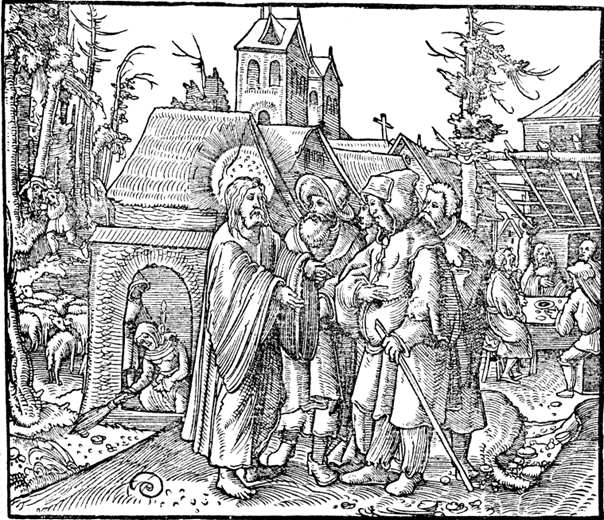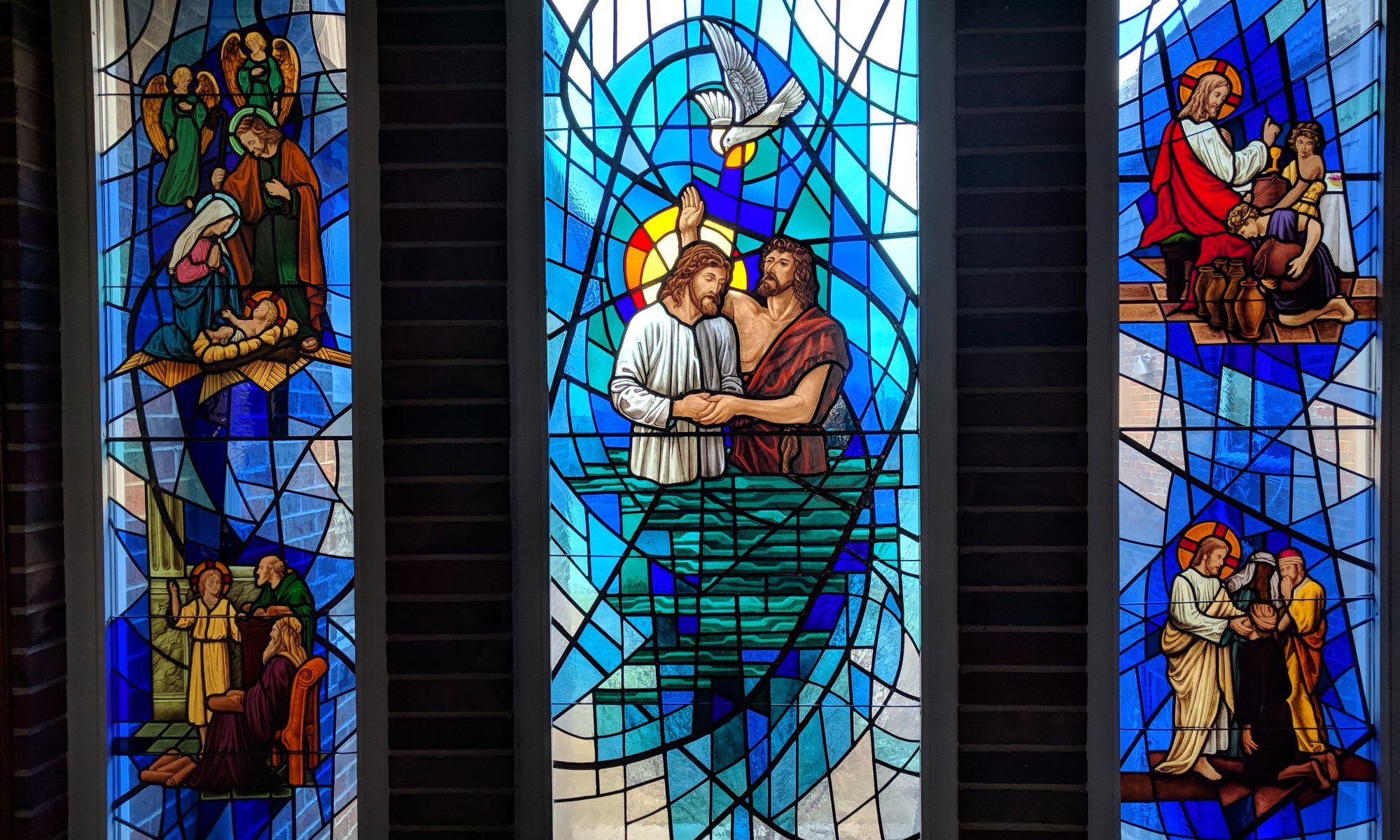
Lessons: Micah 7:18-20, 1 Timothy 1:12-17, Luke 15:1-10
Hymns: LSB 608, 609, 864, 696, 966
Grace, mercy, and peace to you from God our Father and our Lord and Savior, Jesus Christ. Amen.
As we journey through life, we keep on looking for freedom. As Americans, we already enjoy incredible freedom—so much so, many do not appreciate what they have. And even more so, as Christians, we have freedoms that surpass our human understanding since Jesus has rescued us from bondage to sin, death, and the devil when He paid for our sins on the cross, rose from the dead, and opened the gates of Heaven to all who believe.
Despite having these freedoms already, we keep looking for more. Youth look for freedom from their parents’ supervision. Many head to college, thinking they are finally free from the rules and control that they had under their parents’ roofs. Many desire to be free from the rules of the workplace. Many want the freedom of retirement so they can do what they want when they want. Many think big paychecks or a large retirement accounts means freedom. Some love the feeling that tobacco, alcohol, or graver substances give because it makes them feel free from their troubles or concerns. Some who have bound themselves to their spouses in holy matrimony are seeking freedom from their marriage through separation or divorce. Even some parents are wishing for freedom from raising their children. Many think the Supreme Court is whittling away freedom by stating abortion is not a right protected under the Constitution, for they want to be free to engage in any type of sexual activity whenever they want and be free of any responsibility or consequence of their sexual activity.
While we may think that some sins bring freedom, they never do. There may be immediate consequences. We may be scarred physically or emotionally for years. Even if we’ve gotten away with certain sins scot-free in this life, we still must face Judgment Day.
We love the freedoms we enjoy in this country. Yet, these freedoms can only continue when our citizens embrace strong family units and values, along with strong morals and decency. When these erode, so do our freedoms. We would like to think that we can do whatever we want in a free country, unfettered from laws and regulations. But when our neighbors begin to suffer from us abusing our freedoms, then that’s when the government steps in and regulates. The Weights and Measures Division in Missouri exists because some abuse their freedom in commerce and try to cheat the scales. Hence, regulation. As fraud, abuse, and immorality hurt more people, then comes increasing regulation. Then, that supposed freedom in sin or vice becomes a greater burden—not just to the one committing it, but to all.
Ultimately, our sins are a burden that will be addressed on that great day of Judgment when Jesus returns in glory.
Yet, we must not, as Christians, fear that Day as if God is planning to send us straight to Hell for our many sins. Instead, we must see that Day in view of Jesus who is our Good Shepherd and Great High Priest. “For God did not send his Son into the world to condemn the world, but in order that the world might be saved through him.” (John 3:17). That’s why sinners and tax collectors did not shy away from Jesus but drew near to Him. That’s why Jesus received sinners and tax collectors and ate with them. That’s why these sinners were more than willing to listen intently to Jesus’ saving Word. For in Christ, they received a freedom that their sins or riches never gave them. They will not be judged guilty on the Last Day, but they will be declared innocent, for they believed in Jesus who took away their sin through His all-sufficient sacrifice on the cross. Jesus forgave these sinners and tax collectors, and declared them righteous in Christ.
Some, however, figured the Gospel could not be granted to the greedy, to swindlers, cheats, adulterers, or fornicators. The Pharisees and scribes grumbled at Jesus for receiving sinners and eating with them. And so, Jesus told them a series of parables. We heard two of them: the Lost Sheep and the Lost Coin. The third one is perhaps the most famous and loved, the Parable of the Prodigal Son. Jesus teaches these parables to address the Pharisees and scribes’ grumbling and complaining—teaching them truths concerning His Kingdom.
In both parables we heard today, the lost had previously belonged to their master. The lost sheep had been part of the fold, and the coin had been in the woman’s possession. The sheep wandered off, and the coin got lost. The shepherd goes after the sheep, and the woman lights a lamp, sweeps the house, and searches until she finds it.
Jesus is teaching that the sinners and tax collectors who drew near to Jesus to hear Him had belonged to Him, became lost, and are now found. These sinners and tax collectors were part of God’s family, added to His fold by grace through faith. But then they fell out of grace—walking in a manner contrary to God’s Word. Their sinful choices meant they were now on the path to Hell. But the Lord had mercy on them. He sought them out. He brought them back to His fold. He called them to repentance, that they would plead guilty of their sin and turn from their sinful pasts toward the Savior who offers them forgiveness and reconciles them to their Father in Heaven.
It is true, we will all face Judgement Day. As Christians who have been redeemed by the Blood of the Lamb, we will be counted as His sheep, and Jesus will say to us, “Come, you blessed of My Father, inherit the kingdom prepared for you from the foundation of the world” (Matt. 25:34). Jesus will receive us sinners and eat with us. In fact, He does so even now. We are already members of His family by Baptism, and we are invited to feast with Jesus in the Lord’s Supper.
In contrast to the Pharisees and scribes’ grumbling and complaining, Jesus says there is joy in Heaven among the angels of God when sinners repent. This teaches us a few things.
First, the Church has an obligation to call sinners to repentance. While many would prefer to continue in their wayward ways, not recognizing the value of Christ’s forgiveness, the Church must do the uncomfortable task of bringing them back. If a sheep were stuck in a bog and the shepherd uses his staff to hook that sheep by the neck to drag it to safety, that sheep wouldn’t like what was happening to it during its rescue. But it is necessary. In the same way, many do not want to be accused of their sin or dragged back to Christ’s fold through repentance. The result, though, is good. The sheep is saved, being in safety. In the same way, sinners are saved and brought to safety of Christ’s Church where Jesus forgives and restores them.
Unfortunately, many Christians feel it is their obligation to protect the wayward from the Church. They’re afraid the wayward sinner’s feelings may get hurt and won’t ever return. They don’t understand the gravity of the impenitent’s sins—that those sins are leading to eternal condemnation. Let us not fall into these evil traps. We never help people when we see them caught up in sin and allow them to continue in it. The Church is here for the addict, adulterer, and abortionist. When we love them in Christ, we will want them to enjoy the freedom from sin that Jesus offers.
Second, this means the Gospel is not limited to certain people with the best outward behavior. Jesus didn’t die just for the person who is the best at the game of charades. The Church doesn’t exist so people can put on their best show of good behavior. Instead, the Church is a hospital for sinners like you and me. We come with our week’s worth of sin, our many burdens and cares. We go home forgiven, for God declares us righteous in the Absolution, strengthens our faith through His Word, and feeds us the Body and Blood of Jesus for our forgiveness in Holy Communion.
The thought that Jesus would fellowship with sinners and tax collectors left a bitter taste in the Pharisees’ mouths. When we look around and see a congregation full of repentant sinners, we are not repulsed by anyone here. Provided that all live in repentance, turning from their sins, we rejoice that sinners have gathered here in Christ’s Church. It’s where they need to be. It’s where we need to be. For Jesus is present to bless us with His forgiveness and righteousness.
Third, we joyfully receive back wayward sinners who repent. Consider that great joy the woman had when she found her lost coin. She gathered her friends and neighbors, saying, “Rejoice with me.” The shepherd also called his neighbors and friends, saying, “Rejoice with me, for I have found my sheep that was lost.” Instead of being angry at the sheep or the coin for getting lost by dwelling on the past, there’s joy over their present state. They are restored.
Jesus’ words cannot be emphasized enough when He said, “I tell you, there will be more joy in heaven over one sinner who repents than over ninety-nine righteous persons who need no repentance” and “I tell you, there is joy before the angels of God over one sinner who repents.” (Luke 15:7, 10). As forgiven Christians who have received Christ’s bleeding, dying love, we ought to be filled with joy. The Divine Service is joyful, for Christ is present, forgiving us sinners. Studying the Scriptures is joyful, for they are the words of eternal life.
And finally, this results in true freedom. While we may find ourselves continually looking for various forms of freedoms, we must recognize the freedom we now have in the Gospel of Jesus Christ. When baptized in the name of our Triune God, we are joined to Christ. We die to sin and rise to newness of life. We now belong to Him, freed from our sins, freed from our pasts, freed from the pollution we’ve received from others. Therefore, when the Son of God sets us free, we shall be free indeed (John 8:36). Amen.
The peace of God which passes all understanding keep your hearts and minds in Christ Jesus to life everlasting. Amen

